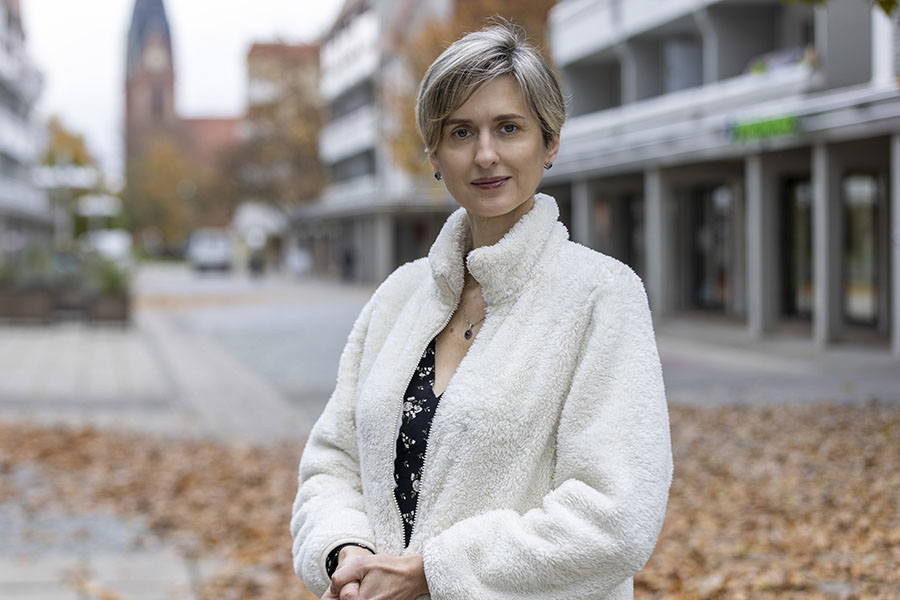„Everything starts with words, every conflict, every aggression” - Professor Yulia Krylova-Grek analyses the narratives of Russian propaganda
The war in Ukraine is not only a military conflict, but also a new kind of information warfare, says Yulia Krylova-Grek, Professor at the Kyiv Mohyla Academy and researcher at the University of Uppsala. She was one of the first KIU fellows to come to the Viadrina for a three-month research stay. During a lecture, she spoke about anti-Ukrainian myth-making, the dual function of the language in and under the Russian propaganda narratives.
A picture is projected onto the wall in the Gräfin Dönhoff building, room 102, showing a face that appears to be disintegrating into puzzle pieces. Beneath the puzzle pieces is written: ‘Words matter’. Words have power, they can shape public opinion, they can both support and discriminate. They stand next to the event title ‘Ukraine and Russia: Deconstructing Myths and Analysis of Propaganda Narratives’ - Yuliya Krylova-Greks research topic.

Heide Fest
She specializes in socio- and psycholinguistics and is one of the KIU fellows who had come to the Viadrina last November for a research fellowship. Her research focusses on Russian narratives about Ukraine, how they have changed and how it works rhetorically. Propaganda in this context refers not only to the language circulating in the media, but also includes a broader context, such as propaganda in education and the arts.
‘Everything starts with words, every conflict, every aggression.’ Krylova-Grek explains that the weight of words is particularly important in politics and public discourse. In her research, she looks at the public discourse in Russia since 2012: official government communication, media reports, and social media content. She sees a turning point in 2014. Prior to that, there seemed to be a broad consensus in Russia, that Ukraine was a sovereign country. With the outbreak of the Euromaidan protests in late 2013 Russia feared that Ukraine would break away from Russia's geopolitical influence, Krylova-Grek explains. Narratives that were particularly enforced between 2014 and 2021 after the annexation of Crimea and the outbreak of war in eastern Ukraine were: ‘Ukraine historically belongs to Russia, Ukrainians and Russians are one people’. Since 2014, there has not been a single day without disinformation and anti-Ukrainian campaign in the Russian media, states the linguist.
Since 2022, targeted disinformation has become even more widespread. Among other things, calls for the destruction of the ‘Ukrainian political nation’ and the assimilation of Ukrainians have been actively voiced in the Russian media. Also, using a narrative based on the archetypes of the Second World War, Ukrainians are labelled as fascists within Russian media. Yulia Krylova-Grek finds many examples of this in her research. She shows a Russian propaganda photo showing Ukrainian President Volodymyr Zelenskyy in a SS uniform, or headlines about NATO's alleged military plans to attack Russia. The massacre in Bucha is called ‘staged footage’, the occupation is newly interpreted as ‘liberation’.
For more than a decade, she has been analysing Russian narratives about Ukraine, how verbal ideological structures are used by the Russian authorities and media to construct anti-Ukrainian myths, and how linguistic motifs are changing. According to Yuliya Krylova-Grek, the destruction of Ukrainian identity and the delegitimisation of its sovereignty have become a central component of this process.
The propaganda is not only effective inside Russia, but also has an impact abroad. In 2014, Germany and other European countries simply were not paying enough attention when Russia had been actively building up its military capabilities for years. The general public lacked information about what was happening in the Russian media, she says. Not only were there aggressive narratives about Ukraine, but there were also threats being made to other European countries. The media has great influence on which topics are given attention, says Yuliya Krylova-Grek. She therefore appeals to the public and media representatives alike: ‘Pay attention!’
Lea Schüler
Back to the news portal
Share article: